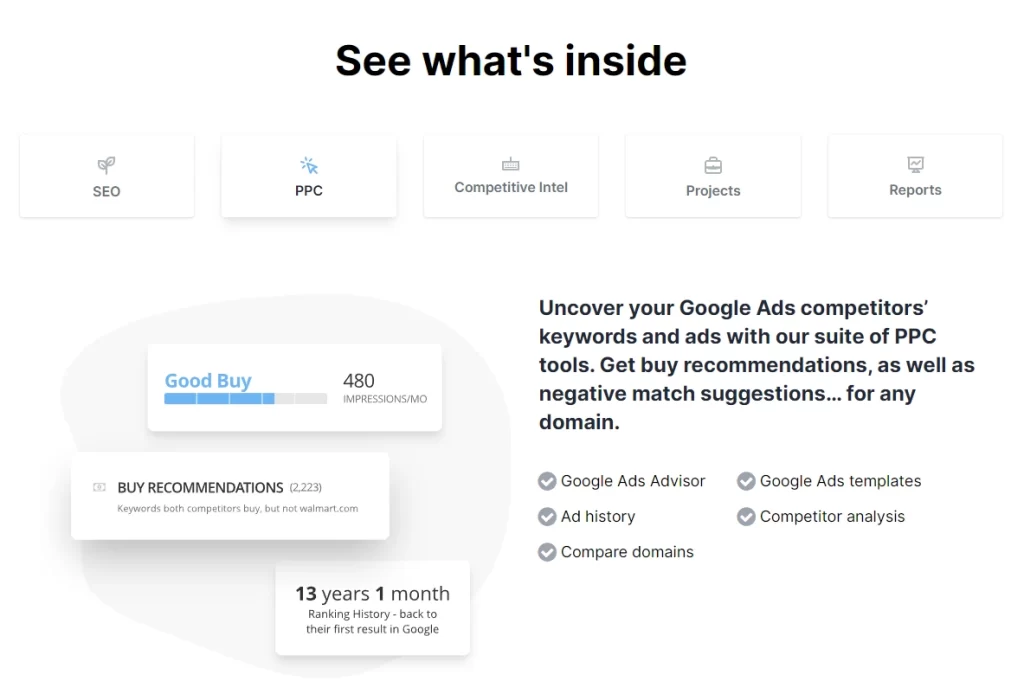In today’s hyper-competitive digital marketing landscape, businesses are perpetually striving to outpace their rivals. A key arena for this contest is Google AdWords, now known as Google Ads. If you have ever found yourself contemplating, “how much is my competitor spending on AdWords?”, you’re not alone. This crucial question is one that echoes in the minds of many business owners and digital marketers.
In this comprehensive guide, we’ll explore this question in depth. Our aim is to empower you with knowledge, strategies, and techniques that can help you leverage this information to your advantage. By understanding the intricacies of your competitor’s AdWords spend, you can gain valuable insights that could catalyze your marketing efforts, allowing you to formulate more effective and targeted strategies.
Towards the end of this article, we will also introduce you to our Google AdWords Competitor Analysis Service, a comprehensive service designed to give your digital marketing strategies a significant boost, by doing the heavy lifting for you.
Understanding Google AdWords (Google Ads)
To start with, let’s dive into what Google AdWords entails. Google Ads is a pay-per-click (PPC) advertising platform. Businesses can advertise their products or services through ads that appear on Google’s search engine results pages (SERPs). Advertisers bid on keywords that they believe their potential customers are likely to use when searching for products or services. They then pay Google a fee each time a user clicks on their ad, hence the term ‘pay-per-click.’
Google Ads works on an auction system, which takes place every time a user performs a keyword search. To win this auction and see your ad appear in relation to specific keywords, you need to optimize your Quality Score and bid amount. The Quality Score depends on the quality of your ads, landing pages, and the relevance of the keyword to the ad group. It’s a dynamic ecosystem, where your competitor’s strategies can directly affect your performance.
But it’s not just about getting your ads displayed. The end game is conversions. This might mean making a sale, getting a sign-up, or even achieving a high level of engagement. The ultimate goal depends on your specific business objectives.
Why Competitor AdWords Spending Matters
You might ask, “Why should I care about my competitor’s AdWords spending?” The answer lies in the value of strategic insights you can gain from this knowledge. Understanding your competitor’s AdWords spending can equip you with valuable information about their digital marketing strategies. Here are a few reasons why this matters:
- Intensity of Competition: If your competitors are spending a significant amount on Google Ads, it indicates that they are heavily invested in online marketing and see value in it. This could mean that the competition for keywords in your industry is intense, and you might need to step up your game to keep up.
- Keyword Worth: By analyzing how much your competitors are spending, you can gauge the worth of your targeted keywords. If your competitors are willing to pay a high cost-per-click (CPC) for certain keywords, those keywords are likely driving valuable traffic and conversions for them.
- Competitor’s Financial Health: This might seem like a long shot, but sometimes, a company’s AdWords spending can provide subtle clues about their financial health. If a competitor is consistently increasing their AdWords budget, it could indicate a period of growth or an aggressive marketing strategy. Conversely, a decrease might suggest budget cuts or a shift in strategy.
In the upcoming sections, we’ll dig into how you can estimate your competitor’s AdWords spending and how to utilize that information. Stay tuned for a deep dive into these crucial topics.
How to Estimate Your Competitor’s AdWords Spending
Uncovering the dollar amount your competitors are allocating to their AdWords campaigns can seem like trying to find a needle in a haystack. Google doesn’t disclose this information openly for understandable privacy and competition reasons. However, with the right strategies and tools, you can start to piece together a realistic estimate. Let’s break down some of the most effective methods.
Keyword Analysis for Google AdWords
Your competitor’s keywords are the backbone of their AdWords campaigns. By identifying the keywords they are targeting, you can start to form an understanding of their audience, their product/service offerings, and their marketing strategy.
Start by listing your main competitors. These are businesses that offer similar products or services and target the same audience as you. Next, use tools such as SEMrush or Ahrefs to perform a competitor analysis. Input your competitor’s website, and these tools will return a list of keywords they rank for.
Pay particular attention to the estimated volume, cost per click (CPC), and the competition level of these keywords. This can give you a sense of the budget your competitor may be working with. If they’re targeting high-cost, high-competition keywords, they’re likely dedicating a significant budget to their AdWords campaigns.

AdWords Auction Insights
Google’s Auction Insights report is a goldmine of information. Although it doesn’t directly show you how much your competitors are spending on AdWords, it provides critical data on who is competing with you in keyword auctions.
The Auction Insights report gives you data on six different metrics for your chosen keywords:
- Impression Share: This is the number of impressions your ads have received divided by the total number of impressions your ads were eligible to receive.
- Overlap Rate: This shows how often another advertiser’s ad received an impression in the same auction that your ad also received an impression.
- Position Above Rate: This is how often the other participant’s ad was shown in a higher position than yours when both of your ads were shown at the same time.
- Top of Page Rate: This reveals how often your ad (or the ad of another participant, depending on which row you’re viewing) was shown at the top of the page in search results.
- Outranking Share: This is how often your ad ranked higher in the auction than another participant’s ad, or if your ad showed when theirs did not.
These metrics can give you a clearer understanding of the competitiveness of your keyword auctions, hinting at how much your competitors are willing to spend on AdWords.
Third-Party Tools for Google AdWords Competitor Analysis
Various third-party tools can help estimate your competitor’s monthly Google Ads budget. SpyFu, for example, provides data about your competitors’ keywords, including estimated monthly clicks and estimated CPC. It also gives you an estimate of their monthly AdWords budget.
iSpionage is another useful tool. It offers an estimated budget, along with information on how long the competitor has been running ads for particular keywords and their estimated daily budget.
It’s important to remember that while these tools provide helpful data, they are only estimates. They are not 100% accurate, but they can still offer a reasonable approximation of your competitor’s AdWords spend.

Manual Estimation
If you prefer a hands-on approach, you can do a manual estimation of your competitor’s AdWords spend. This process involves identifying your competitor’s top keywords, calculating the average CPC for these keywords, and then estimating the number of clicks they receive per month.
You can find keyword data through tools like SEMrush or Ahrefs. Google’s Keyword Planner can provide data on the average CPC. For click estimates, you can use industry-specific CTR benchmarks, combined with the organic traffic your competitor receives for those keywords.
While this method requires a bit of legwork and several assumptions, it can provide a rough idea of your competitor’s AdWords budget.
What’s Next?
Now that you have estimated your competitor’s AdWords spending, it’s time to ask: how can you use this information to your advantage? In the next section, we delve into how to leverage this knowledge to sharpen your own AdWords strategies and gain a competitive edge.
Leveraging Competitor AdWords Spending Information
With an estimate of your competitors’ AdWords spend in hand, you’ve reached a turning point in your strategic planning. This information, while valuable on its own, is most effective when used to enhance your own marketing strategies. In this section, we’ll discuss how to leverage these insights, focusing on understanding your competitor’s strategies, identifying gaps, and optimizing your own campaigns.
Understanding Your Competitor’s Strategies
A large part of leveraging your competitor’s AdWords spending information is gaining insight into their strategies. For example, if a competitor is spending a significant amount on a specific keyword, there’s a good chance that keyword is performing well for them. This can provide insights into the keywords that could also be valuable for your business.
Keep in mind that while a high-spending competitor might be a source of intimidation, their hefty budget might also indicate a lack of optimization in their campaigns. A large AdWords spend isn’t always synonymous with a successful strategy. If your campaigns are well optimized, you could achieve similar results for less money.
The key is not merely to imitate your competitor’s strategy but to understand it and then build a better one. If they’re heavily invested in specific keywords, would it make sense for you to compete directly, or could you find more success (and less competition) targeting long-tail keywords?
Identifying Gaps in The Market
While reviewing your competitor’s strategies, look for any gaps or opportunities they might be missing. These gaps could be less competitive keywords, different ad schedules, or underutilized ad types.
For instance, if your competitor is only running text ads, this might present an opportunity for you to leverage Google Shopping ads or display ads. Or, if they are primarily focusing on desktop users, there might be an opportunity for you to focus on mobile users, where the competition could be lower.
In the same vein, your competitor’s ad schedules can provide useful insights. If your competitor only runs ads during business hours, for instance, but your target audience is also active during non-business hours, there may be a gap you can exploit by running ads during these times.
Optimizing Your Own Campaigns
Understanding how much your competitors are spending on AdWords and their strategies can help you optimize your own campaigns.
Firstly, it can give you an idea of how much you should be spending. If your competitor is investing significantly in AdWords and seeing success (which you can judge based on factors such as their growth, prominence, and market share), you may need to increase your budget to stay competitive.
Secondly, it can help with keyword optimization. If your competitor is spending a lot on a specific keyword, and you’re not seeing the same success with that keyword, it might be because your ad or landing page isn’t as optimized. Look at what your competitors are doing right and learn from it.
Moreover, knowing your competitor’s budget can inform your bidding strategy. If a competitor is outbidding you for certain keywords, you could consider raising your bids. However, it’s important to balance this with a focus on your return on ad spend (ROAS) and ensure that the increased spending will result in profitable conversions.
Stepping Beyond the AdWords Arena
While focusing on Google AdWords is important, it’s also crucial not to neglect other areas of digital marketing. SEO, content marketing, social media marketing, and email marketing are all components of a well-rounded digital marketing strategy. The insights you gain from understanding your competitor’s AdWords strategies can often be applied to these areas as well.
For instance, the keywords your competitor targets in AdWords are likely also important in their SEO strategy. You can use these keywords to inform your own SEO efforts, optimizing your website’s content to improve your organic search rankings.
Similarly, if your competitor is targeting certain demographics with their ads, you could create content that appeals to these demographics, or use social media platforms popular with these demographics to broaden your reach.
Our AdWords Competitor Analysis Service: The Final Step in Dominating Your Market
In the digital marketplace, understanding your competition is just as important as understanding your customers. With the wealth of information available today, there’s no reason not to capitalize on competitor analysis to improve your own strategy. In this section, we will dive deeper into how our Google AdWords Competitor Analysis service can help you maximize the information you’ve gleaned about your competitors’ AdWords spending and overall digital strategy.
How Our Service Works
Our AdWords Competitor Analysis service focuses on a holistic approach to your digital marketing strategy, taking into account not only your business and its unique selling propositions, but also the competitive landscape in which you operate.
At the heart of our service is data. Leveraging advanced tools and techniques, we analyze your competitors’ AdWords strategies, extracting valuable insights and crafting a blueprint for your success. Our process is broken down into the following steps:
- Identify Your Competitors: We begin by identifying your primary competitors. These are typically businesses offering similar products or services in the same geographic area. However, in the digital age, we also consider secondary competitors who may not have the same physical presence but vie for the same keyword space.
- Analyze Their Strategies: We analyze your competitors’ keywords, ads, landing pages, and overall campaign structures. We pay close attention to the nuances of their messaging, the specific keywords they’re targeting, and the strategies they’re using to attract and convert customers.
- Estimate Their Spend: Using a variety of tools and techniques, as described earlier in this blog post, we estimate your competitors’ AdWords spend. This gives you a benchmark for your own spending and provides insight into the level of investment required to compete effectively.
- Uncover Their Strengths and Weaknesses: Our analysis doesn’t stop at the tactical level. We also uncover the strategic strengths and weaknesses of your competitors’ AdWords campaigns. This can reveal valuable opportunities for you to outperform them.
- Provide Recommendations: Finally, we use the insights we’ve gathered to provide strategic and tactical recommendations for your own AdWords campaigns. These recommendations cover everything from budget allocation and keyword selection to ad copy and landing page design.
Benefits of Our AdWords Competitor Service
There are several benefits to utilizing our AdWords Competitor Analysis service:
- Data-Driven Decisions: Our service enables you to make informed, data-driven decisions. Instead of guessing what might work, you’ll be able to leverage real data from your competitors’ campaigns to optimize your own.
- Budget Optimization: Understanding your competitors’ spend helps you allocate your budget more effectively. You’ll gain insights into which keywords are worth the investment, and where your money would be better spent.
- Increased ROI: By understanding what’s working for your competitors, you can implement proven strategies and avoid costly mistakes, leading to an increased return on your AdWords investment.
- Stay Ahead of the Curve: In the fast-paced world of digital marketing, staying ahead of the curve is crucial. Our service helps you stay updated on the latest trends and shifts in your industry, allowing you to adapt quickly and maintain a competitive edge.
As you navigate the competitive landscape of Google AdWords, understanding how much your competitors are spending on their campaigns and leveraging that information effectively can provide you with a significant advantage. With our comprehensive Google AdWords Competitor Analysis service, we aim to deliver this advantage to you, helping you dominate your market and boost your online presence.



